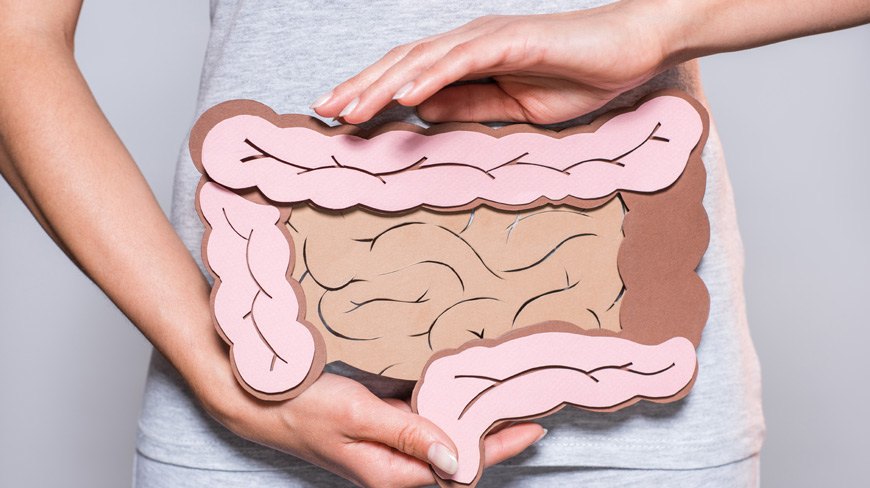What Does the Large Intestine Do? Gastro FAQ
Your large intestine, also known as the colon, plays a huge role in digestion.
The digestive tract, or gastrointestinal (GI) tract, is the pathway for food in your body. It is a continuous tube that extends from the mouth to the anus and is responsible for:
- Digesting food
- Absorbing nutrients
- Getting rid of waste
Anatomy of the Large Intestine
The large intestine is at the end of the digestive tract, handling the final stages of digestion. Spanning about 5 feet, your large intestine is divided into six parts:
1. Cecum
The cecum is the starting point of the large intestine, found at the junction where the small intestine ends and the large intestine begins. It takes digested food material from the small intestine and begins the process of absorbing water and salts. The appendix is also attached to the cecum.
2. Ascending Colon
The ascending colon travels upward from the cecum along the right side of your abdomen. It continues the process of absorbing water and other key nutrients from the digested food. Waste material starts to change into a more solid form here.
3. Transverse Colon
This section crosses your abdomen from right to left. It acts as a storage site and continues with absorption. As waste material moves through the transverse colon, it gets more solid.
4. Descending Colon
The descending colon moves downward on the left side of your abdomen. This part of the large intestine mostly stores what’s left of digested food that will be emptied into the rectum.
5. Sigmoid Colon
The sigmoid colon is an S-shaped section that connects the descending colon to the rectum. It stores waste until it’s ready to be expelled from the body. The sigmoid colon’s muscular contractions help move the waste toward the rectum.
6. Rectum
The rectum is the final section of the large intestine where waste passes through to leave the body.
What Does the Large Intestine Do?
When digested food enters the large intestine, water and electrolytes like sodium and potassium are absorbed, turning the digested material into waste to be removed from the body. Beneficial bacteria in the large intestine also play a part, breaking down waste to form stool.
How Do I Know If My Large Intestine Is Healthy?
Sometimes, the large intestine can become inflamed or infected, leading to symptoms such as:
- Abdominal pain
- Gas or bloating
- Diarrhea
- Constipation
If you have regular, comfortable bowel movements and do not suffer any of the above symptoms, your colon is likely healthy. There are, however, conditions like polyps and colon cancer that you may not notice until they are significantly advanced.
Which Conditions Have to Do with the Colon?
Various conditions can impact the health and functioning of the colon, each with its unique set of symptoms and treatment approach.
- Colorectal cancer: Caused by malignant growths in the colon or rectum, sometimes starting from benign polyps.
- Diverticulitis: Inflammation or infection of small pouches in the colon walls.
- Ulcerative colitis: A type of inflammatory bowel disease (IBD) causing inflammation and ulcers in the colon and rectum.
- Crohn’s disease: A form of IBD that can affect any part of the gastrointestinal tract, including the colon.
- Irritable bowel syndrome: IBS is a disorder affecting the large intestine with symptoms like cramping, abdominal pain, and changes in bowel habits.
- Colonic Polyps: Benign growths on the colon’s inner lining, potentially leading to cancer.
What Is a Colonoscopy?
A colonoscopy is a diagnostic test that offers an in-depth look into the health of your large intestine. During this procedure, a long, flexible tube with a camera on the end is inserted into the rectum and gently guided through the colon. Your doctor can visually inspect the entire colon for abnormalities such as polyps, inflammation, or ulcers.
A colonoscopy is also a preventive screening tool. Polyps, which could potentially turn into cancer, can be identified and removed during the procedure.
Colonoscopy is key in early detection and prevention of colorectal cancer.
How Can I Take Care of My Large Intestine?
Some effective strategies for sustaining colon health include:
- Eating lots of high-fiber foods
- Staying hydrated
- Exercising regularly
- Getting a colonoscopy if you are over the age of 45!
A colonoscopy is also important if you experience changes in your bowel habits or have a history of digestive issues like IBS or Crohn’s disease.
If you have any concerns regarding your large intestine health, don’t hesitate to contact our gastroenterology experts. Our team is dedicated to providing you with comprehensive care and guidance to take care of your gut health.
Don’t continue to worry about your digestive health – schedule an appointment today!
Request Appointment
Related:


